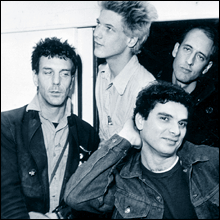![[Sidebar]](/standard/image/sidebar.gif)
![[Music Reviews]](/standard/image/headers/music_reviews_header.gif)
| clubs by night | club directory | bands in town | concerts | hot links | reviews & features |
No fun
The art of the buzzkill
by Douglas Wolk
Flipper
"Tropical Robots," from Guided by Voices' new Hold on Hope EP (TVT), not only fails to deliver the goods, it exists to fail to deliver the goods. It starts out as if it were going to be one of GBV's best songs ever, with a surehanded introduction and a killer verse melody. Then someone harmonizes on a second verse, as if he were building up to a really massive chorus and the band were about to kick in. And then . . . it just stops. No kicking-in, no chorus, no more song. It's incredibly annoying.But promising fun and not coming through can be a band's intention, and sometimes even fun in its own way. There's a small tradition of recordings that deliberately piss off listeners who are expecting pleasure; they raise expectation, then spit at it. Lou Reed's all-noise Metal Machine Music doesn't fit in this category, since it's an extended middle finger from start to finish, and neither does Bruce Willis's The Return of Bruno, since it was meant to be enjoyable. The point is malice aforethought, the deliberate killing of a genuine buzz. Here are six of the most malicious records ever made:
Flipper, "Brainwash" (Subterranean/Infinite Zero). A 1981 B-side that taxis for six and a half minutes, just to fool you into thinking it's about to get off the runway. A grubby hardcore riff starts up, with that great, nasty bass throb that Flipper always had. Bruce Lose tries to tell a story but can't quite find the words, then cuts himself off -- "Never mind, forget it, you wouldn't understand anyway." The riff stops. Then the entire process repeats. Twelve times.
Bonzo Dog Band, "Canyons of Your Mind" (Liberty/One Way). In 1969, the Bonzos were a silly little rock band with lots of witty little songs that go the way this one (originally from the Tadpoles LP) starts out: a parody of late-'60s Elvis, with fake Jordanaires going ba-ba-ba and a rhythm section that staggers along as if it had had a few. Then, a minute or so in, Neil Innes unleashes a guitar solo of Stygian ghastliness. Every note is hideously wrong, and articulated like a sucking chest wound, as he emits rhesus-monkey-orgasm yelps for the solo's entire duration; the whole thing makes a convincing argument that electrifying guitars in the first place was a mistake on the order of Original Sin. It's actually pretty hilarious if you can avoid reflexively stabbing at the "stop" button.
New Order, "Every Little Counts" (Qwest). They don't seem to take the last track on 1986's Brotherhood too seriously -- Bernard Sumner cracks up giggling a few lines in -- but it still seems to be building toward some kind of dramatic climax. Suddenly, in the middle of an orchestral swell, there's a horrible scratching noise, some needle-on-label noise, a quarter-second fragment of unrelated music, and the album's over. The only rational explanation is that your cat has just jumped onto your turntable. Thousands of former teenage new-wavers have never forgiven New Order for harshing their makeout sessions.
Rudimentary Peni, Pope Adrian 37th Psychristiatric (Outer Himalayan). Just about the finest of British hardcore bands in the early '80s (there weren't a lot, but they did sweep the category), Rudimentary Peni returned in 1995 with this queasily weird album. It starts with a tiny, irritating loop of a voice muttering "Papas Adrianus" over and over, but then the first song kicks in, and it rocks so hard, you don't care that the only words are "Pogo Pope Pogo Pope Pogo Pope." Except the "Papas Adrianus" loop comes back at the end of the song . . . and continues, more or less audibly, for the remaining 11 songs. After 40 minutes, you'll believe you're the pope. Which may be the point.
Napalm Death, "Hung" (Earache/ Columbia). The death-metal pioneers played a brilliant if nasty trick on radio with the single version of "Hung," from 1994's Fear, Emptiness, Despair. The "radio edit" starts the same way as the regular version: a full-on detuned assault, with Mark Greenway gargling the words as if he were trying to vomit lye. Then the band get swallowed by a wave of white noise. They can be heard flailing inside it for a little while, as Greenway's voice turns into pure digital distortion, but the last minute of this particular radio-friendly unit shifter is just the sound of overloaded tape.
Rhoda with the Special A.K.A., "The Boiler" (Two Tone/ Chrysalis). This was a single in 1982, when people buying a record credited to this Specials side project probably expected to get a fun bit of ska pop with maybe a touch of social conscience to it. The band play a fluffy little groove, and Rhoda Dakar does a little spiel in character about flirting with guys, wandering around, worrying about getting older. Then she tells the story of a particular date with a guy who asked her out. The story gets claustrophobic, the guy gets nasty, there's nobody else around, he rapes her, and she starts screaming. And screaming. And crying, and screaming, and it goes on, and on, and on -- you stop being a listener and become a witness, and it's still going on. And the band keep playing that fluffy little groove. Again, please note: this was a single. The all-time buzz-kill champion, but a dramatic marvel.
| home page | what's new | search | about the phoenix | feedback |
Copyright © 2000 The Phoenix Media/Communications Group. All rights reserved.
